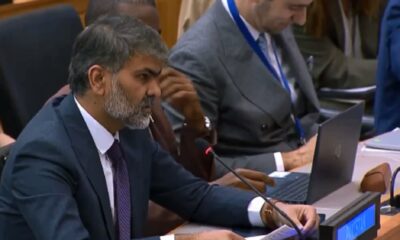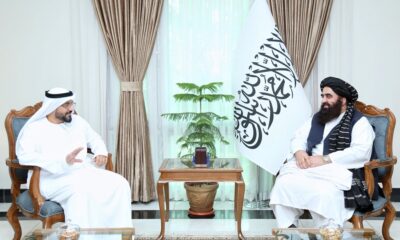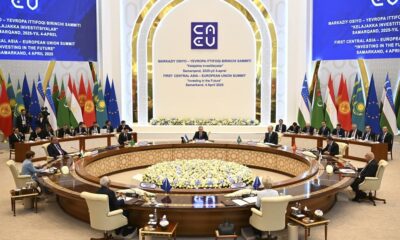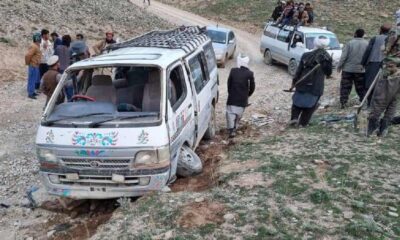Latest News
Afghanistan -Turkmenistan Tango

 Afghanistan is in the process of limiting Pakistan’s veto options on transportation of goods and looking at other routes being a landlocked country.
Afghanistan is in the process of limiting Pakistan’s veto options on transportation of goods and looking at other routes being a landlocked country.
Afghanistan’s President Ashraf Ghani visited Turkmenistan on July 3 upon invitation by President Gurbanguly Berdimuhamedov. Oguzkhan Palace complex in Turkmenistan hosted the high-level talks.
Various issues from security and counter-terrorism, economy and trade, energy, education and transportation infrastructure were discussed. Turkmenistan-Afghanistan-Pakistan-India (TAPI), Turkmenistan-Afghanistan-Pakistan (TAP)electricity project, and Turkmenistan-Uzbekistan-Tajikistan-Afghanistan-Pakistan (TUTAP) electricity transit project were discussed.
Transportation infrastructure cooperation is a way forward to make Afghanistan less dependent on Pakistan, who routinely closes checkpoints along the Durand line. President Ghani the next day told the visiting U.S. senate delegation that Afghanistan has diversified trade and transit links and is no longer dependent on Pakistan.
These are the main routes of transit to Afghanistan:
- Hairtan->Mazar e Sharif
- Mersin, Turkey-> Baku, Azerbaijan -> via ferry on Caspian Sea->Türkmenbaşy->Aqina->Sheberghan ->Mazar e Sharif
- Mersin, Turkey-> Baku, Azerbaijan -> via ferry on Caspian Sea->Türkmenbaşy-> Mary, Turkmenistan ->Torghundi->Herat-> Lashkargah ->Kandahar->Ghazni->Kabul
- Bandar Abbas ->Islam Qala->Herat-> Lashkargah ->Kandahar->Ghazni->Kabul
- Karachi->Quetta->Kandahar
- Karachi->Jalalabad->Kabul
Of these, the first route connects to China, the 2nd and 3rd to Europe, the 4th to Iran and the last two to Pakistan. As of now, the last two routes via Pakistan carry the most freight. When the Torkham gate was closed by Pakistan for an indefinite period following a skirmish between the respective armed forces, the other routes effectively neutralised any economic effect on Afghanistan.
Reconstruction and repairing of the Serhedabad (Azerbaijan)– Turghandi (Afghanistan) railroad and also expanding Aqina railroad were on the agenda of today’s meeting. The Asian transnational railway – Atamyrat-Ymamnzar-Akina was quoted as an example of the developing cooperation in the transport sphere between the two nations. In view of the transit and transportation potentials of the both countries, the presidents emphasized on Afghanistan-Turkmenistan-Azerbaijan-Georgia-Turkey trade and transit corridor and Tajikistan-Afghanistan-Turkmenistan railway. The trade and transit corridor is also known as the Lapis Lazuli corridor and the nations are due to sign an agreement for transporting goods to European markets. Turkmenistan itself serves as the fourth largest export market for Afghanistan.
Afghanistan has already diversified its trade and is no more heavily dependent on Pakistan. Trade volume between Pakistan and Afghanistan has declined from $3 billion a couple years ago to just $500 million in early 2017. That indicates a drop of more than an 80 percent in commerce between Afghanistan and Pakistan.
On the other hand, Afghan-Iran trade volume has increased 25 percent, from $1.5 billion to $2 billion, and now accounts for a quarter of Afghanistan’s total annual trade. The construction of railroad between Iran and Afghanistan and the Zaranj-Delaram Highway in Afghanistan are some factors behind the growth of Afghanistan – Iran trade. Trade with Europe and central Asia accounted for 24% of imports and exports stood at 11.6%.
Cooperation in oil & gas, chemical industry, textile, carpet weaving industry, farming and other sectors was discussed. An MoUs signed between the two nations is for cooperation In the carpet industry. It is worth noting that carpets are among the biggest exports from Afghanistan. Till now most carpets were produced to a pre-final stage and then exported to Pakistan or Iran. This was due to lack of resources like machinery for cutting and edging.
I spoke to the spokesperson of Afghan Chamber Of Commerce & Industries (ACCI) Siamuden Pasarly, who told me, “Till 2013-14, roughly around 80% of the carpets were exported to Pakistan, Iran & final processing done there. Now have our own factories. Industrial parks are under construction in PPP model. At present, 30% of the carpet go to Pakistan and Iran for final processing. We plan to absorb it and sell them under Afghan branding to the west.”
Implemented properly, the agreements at Turkmenistan would lead both to economic prosperity and reduced economic dependency on Pakistan for Afghanistan. It’s still a long way for land-locked Afghanistan to be no longer dependent on Pakistan but it’s a welcome start.
By Aveek Sen – Aveek Sen is an independent journalist working on cyber security and the geopolitics of India’s neighbourhood, focusing on Pakistan, Afghanistan, Iran and Bangladesh. He tweets at @aveeksen
—————–
* Responsibility for the information and views set out in this article lies entirely with the author, and it do not necessarily reflect the editorial policy of Ariana News.

Latest News
Pakistan urges global community to block arms flow to militant groups in Afghanistan

A Pakistani diplomat on Saturday called on the international community to block the flow of modern and sophisticated weapons to militant groups in Afghanistan.
“Terrorist armed groups are in possession of billions worth of illicit arms abandoned in Afghanistan,” Syed Atif Raza, a counsellor at the Pakistan Mission to the UN, told an Arria-Formua meeting of the UN Security Council, convened by Sierra Leone.
“We call upon our international partners to recover the vast stockpile of abandoned weapons, prevent their access to armed terrorist groups and take measures to close this thriving black market of illicit arms,” he said.
Pakistani officials have repeatedly claimed that attacks in the country are planned in Afghanistan and that militants use weapons left behind by foreign forces.
The Islamic Emirate, however, has denied the claim, saying Afghanistan is not responsible for Pakistan’s “security failure”.
Latest News
Gandapur says no Afghan refugee will be ‘forcefully’ expelled from Khyber Pakhtunkhwa
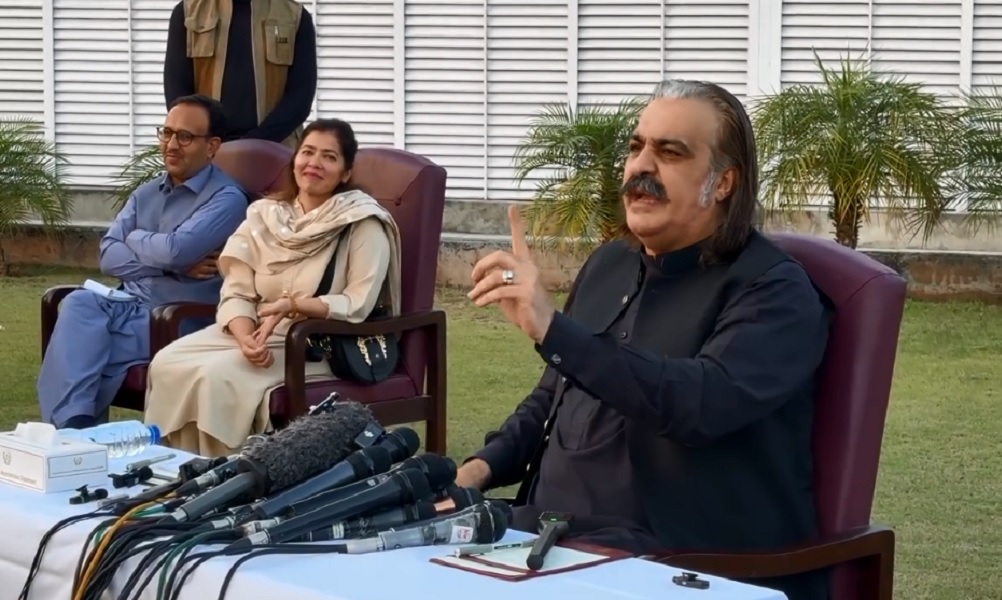
Amid rising tensions over Pakistan’s repatriation plans for illegal Afghan nationals, Khyber Pakhtunkhwa Chief Minister Ali Amin Gandapour said on Friday that no refugees will be forcibly deported from the province.
“We will not allow any Afghan refugee to be expelled by force from Khyber Pakhtunkhwa. We stand firmly against such inhumane deportations,” Gandapur said at a press conference.
The remarks came as the Pakistani government ramps up efforts to repatriate undocumented Afghan refugees and Afghan Citizen Card (ACC) holders, following the expiration of the voluntary return deadline on March 31, 2025.
“The past situation, where Afghan refugees, including women and children, were stranded at the border, tarnished Pakistan’s image,” Gandapur said, reaffirming the provincial government’s commitment to a dignified repatriation process.
“We are setting up camps for voluntary repatriation, and anyone wishing to return will be helped. However, we will not forcibly expel any Afghan refugee,” he stated.
Afghans holding Afghan Citizen Cards (ACC) — issued by Pakistan authorities and held by 800,000 people, according to the United Nations — face deportation to Afghanistan after the deadline.
More than 1.3 million Afghans who hold Proof of Registration (PoR) cards from the UN refugee agency, UNHCR, are also to be moved outside the capital Islamabad and neighbouring city Rawalpindi.
Latest News
IEA has 46 township plans for returnees, minister tells visiting Iranian official
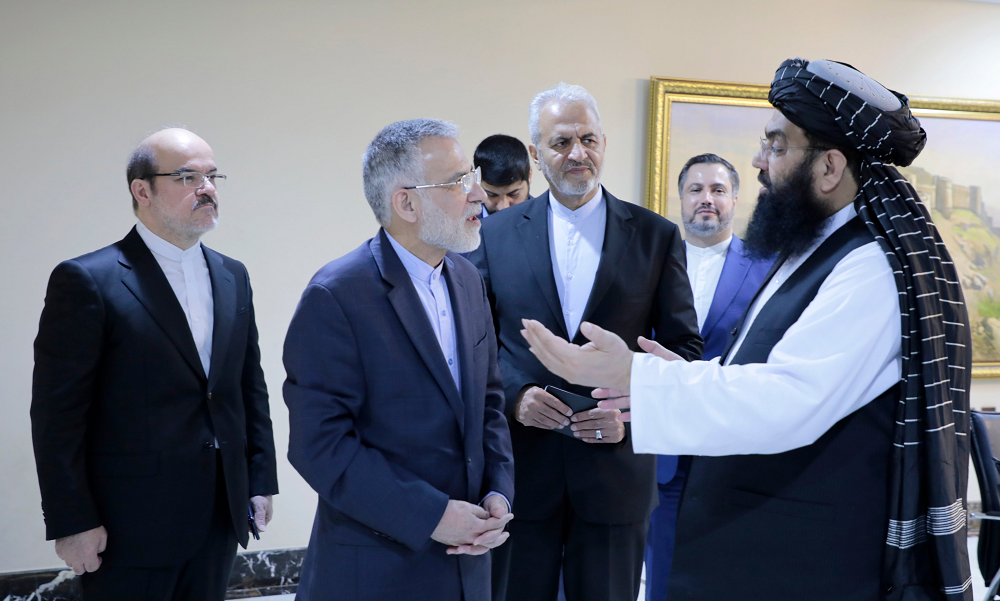
The Islamic Emirate of Afghanistan (IEA) has 46 township plans for returning refugees, Acting Minister of Refugees and Repatriation Mawlawi Abdul Kabir told a visiting Iranian diplomat in Kabul, calling on Tehran to give refugees time to return.
According to a statement issued by the ministry on Saturday, Abdul Kabir said during the meeting that Afghanistan and Iran are friendly neighbors that have many commonalities.
He stressed the need to further develop and strengthen relations between the two countries and said that the frequent visits of high-ranking Iranian officials show that Tehran wants positive and friendly relations with Afghanistan.
Abdul Kabir thanked Iran for its assistance and hosting of Afghan refugees, saying that Iran and Pakistan have been hosting Afghan refugees for the past few decades. He called for more leniency in the treatment of migrants.
He said that the Islamic Emirate is preparing a mechanism to provide legal documents for those migrants whose legal residence in Iran has expired.
In the meeting, Mohammad Reza Bahrami, Iran’s new Assistant Minister and Director General for South Asian Affairs at the Foreign Ministry, invited Abdul Kabir to visit Tehran, and called for repatriation plan to be shared before the trip.
He stressed on the humane treatment of Afghan refugees and appreciated the Islamic Emirate’s initiative to build 46 townships, calling it an important step forward for the return of refugees.
Bahrami noted that there are currently eight million Afghan reguees living in Iran, of whom four million are undocumented or have their residence expired.
-

 Latest News4 days ago
Latest News4 days agoAfghanistan’s reconstruction is in the interest of EU: Uzbek president
-

 Latest News5 days ago
Latest News5 days agoUS won’t rest until all Americans detained in Afghanistan brought home: Rubio
-

 Latest News4 days ago
Latest News4 days agoMinistry of Economy calls on US to release Afghanistan’s frozen funds
-

 Latest News5 days ago
Latest News5 days agoBulgaria brings five people to trial over deaths of 18 Afghan migrants
-

 Latest News3 days ago
Latest News3 days agoPakistan ‘extends’ deadline for a week for Afghans to leave the country
-

 Regional5 days ago
Regional5 days agoChina launches military drills around Taiwan, calls its president a ‘parasite’
-

 Business5 days ago
Business5 days agoGold climbs to record high as tariff worries bolster safe-haven demand
-

 Sport4 days ago
Sport4 days agoIPL 2025: Batters in race for prestigious Orange Cap

